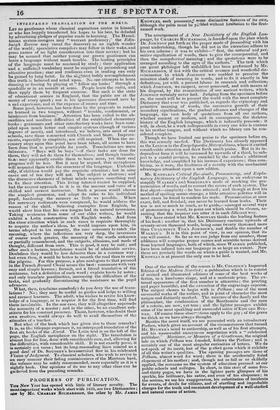INTERP•OED TRANSLATION OF THE JENEID.
LIT no gentleman whose classical aspirations centre in himself, or who has happily transferred his hopes to his heir, be deluded by advertising-pledges of popular roads to learning. The Hamil- tonian system-mongers may "warrant proficiency ;" the Edin- burgh Review may vaunt the discovery as an eighth wonder
of the world; speculative compilers may follow in their wake, and press names of no light consideration into their service; but lie may be assured that neither young nor grown gentlemen can learn a language without much trouble. The leading principles isf the language must be mastered by study ; their application and a sufficiest vocabulary must be acquired by painstaking and attentive practice; ease and readiness even in reading can only be gained by long habit. In the slightest bodily accomplishment
this truth is believed and acted upon. NG one attempts to learn dancing or fencing by playing at " follow my leadee" through a quadrille or in an assault at arms. People learn the rules, and then apply them by frequent exercise. But such is the state of educational science in England, that tile public are at the mercy of every quack ; nor is his ignorance discovered save by a sad experience, and at the expense of money and time.
Some good, however, has been done by the proposals to render us learned in two tongues, without " trouble, confinement, or hindrance from business." Attention has been called to the ab- surdities and needless difficulties of the established elementary books : grammars and other introductory works have been com-
piled upon much better and simpler systems (though of various degrees of merit), and introduced, we believe, into most of our schools, save those connected with Church and State. Improve- silents, especially in simplicity, are still required. When the ne- seessary steps upon this point have been taken, all seems to have been done that is practicable for youth. Translations are mere delusions. "Boys will be boys "—if their tasks are done for them, they will not do them for themselves; and though transla- fiat may apparently enable them to learn more, yet their real progress will be less. But it may be argued, that inetaphrase will acquaint them with the structure of the language. Undoubt- edly, if children would pay the requisite attention : but in nine cases out of ten they will not. The subject is abstruse; and the discursive character of infant minds requires something real to fix their attention. This living interest cannot be supplied, but the nearest approach to it is in the manner and voice of a skilled and earnest instructor. Such a person would choose the simplest grammar, and adapt its rules to his individual pupil, burdening the memory as little as possible. When the necessary rudiments were conquered, lie would address the reason of the child. Selecting examples from English, he would show him that his own tongue had its natural inversions. Taking sentences from some of our elder writers, he would exhibit a Latin construction with English words. And from the close attention which in such cases is requisite thoroughly to acquire the author's ideas, he would impress upon him, in terms adapted to his capacity, the care necessary to catch the meaning, where the inflections are very deep, the inversions of course much greater, the meaning of the words unknown orpartially remembered, and the subjects, allusions, and mode of thought, different from ours. This is good, it may be said ; and after such a lecture, translations would be of admirable service. Doubtless they would be less delusive than in a common way ; bat even then, it would be better to smooth the road than to carry the pilgrim. For this purpose, a plan analogous to that pursued in She French Recueil Choisi seems the best: commence with very easy and simpie lessons ; furnish, not a literal translation of the sentences, but a definition of each word ; explain knots by notes; and only translate peculiarities, increasing the difficulties of the tasks, and gradually discontinuing the assistance as the pupil advances.
What, then, (exclaims somebody) do you deny the use of trans- lations? No; they may be useful as guides and helps to willing and earnest learners. Tile adult, who wishes to revive his know- ledge of a language, or to acquire it for the first time, will find them invaluable. In the one case, they will altogether supersede the necessity of a master; and in the other, be an excellent sub- stitute for his constant presence. Those, however, who doubt their own resolves, would always do well to avail themselves of the stimulus of a teacher.
But what of the book which has given rise to these remarks? It is, as the titlepage expresses it, an interpaged translation of the first six books of the sEneid. The Latin text is on the left of the page, the English metaphrase on the right. The translation is almost line for line, done with considerable care, and, allowing for the difficulties, with considerable skill. It is not exactly prose, it is certainly not verse ; but its long-resounding lines remind us a good deal of Dr. SOUTHEY'S hexametrical flow in his celebrated Vision of Judgment. To classical scholars, who wish to revive in an easy manner their fading reminiscences of the Mantuan bard, the volume may be safely recommended, more especially as it is a sightly book. Our opinions of its use to any other class can be gathered from the preceding remarks.






























 Previous page
Previous page